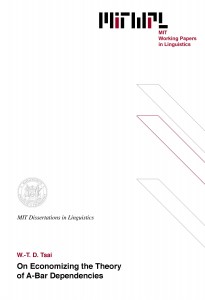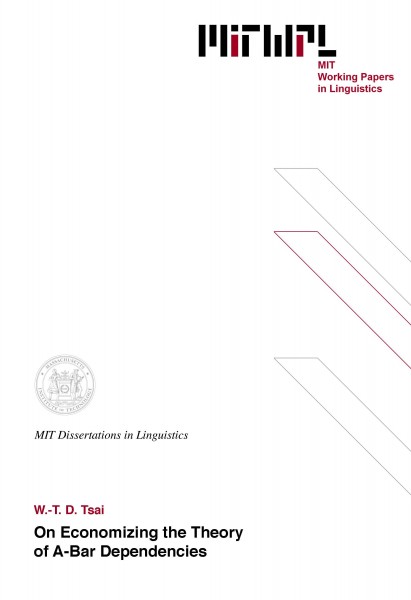On Economizing the Theory of A-Bar Dependencies
W.-T. D. Tsai, 1994
This dissertation aims to derive linguistic variations of wh-question and syntactic asymmetries among wh-expressions from a fairly restricted set of factors under the minimalist approach: 1) binary vs. singulary substitution (i.e., Generalized Transformation vs. Chain formation), 2) noun vs. adverb, and 3) weak vs. strong operator features. Correlations have been established between wh-question formation and quantification in terms of the structural height of binders, as well as the magnitude of unselective binding. Chinese, English, Hindi, and Japanese are examined to give a selective but representative spectrum of this correlationship.
On empirical grounds, we demonstrate that unselective binding and (A’-)Chain formation are different breeds of construal. It is shown that the asymmetries between unselective binding and long wh-movement in general reflect the distinction between binary and singulary substitution.
Our second goal is to relate the (in)definiteness/specificity of nominals to their structural properties. By extending Diesing’s (1992) mapping hypothesis, we present a fairly explicit mechanism of mapping syntactic representations to their corresponding logical forms, centering on the notion of syntactic predicate. This move provides us a simple and optimal way to characterize the interaction between predication and quantification. Existential closure is also shown to observe the Greed principle if understood properly, i.e., as an interpretation procedure rather than a syntactic operation. We also explore the possibility of eliminating the lowering mechanism in favor of the copy theory, and initiate an attempt to reduce the stage-individual asymmetries to the distinction between degree and individual variables in the sense of Heim (1987) and Frampton (1990).
Thesis supervisor: Noam Chomsky
Title: Institute Professor
Table of Contents
Chapter 1 From Lexicon to LF
0 To move or not to move – that is the question 9
1 Toward a minimalist design of wh-dependencies 13
2 Singulary vs. binary substitution 17
2.1 Disintegrate lexical integrity 17
2.2 Dou, dou, dou, and dou 23
2.3 Interrogative construals in Chinese bare conditionals 27
2.4 Japanese mo-quantification and Chinese dou-quantification 37
2.5 A conceptual problem and an empirical solution 48
3 Nouns vs. adverbs 54
4 Strong vs. weak operator features 65
5 An overview 73
Chapter 2 Some asymmetries between chain formation and unselective
binding
1 Long distance construals of amount wh’s 76
2 Interrogative construals in dou- and mo-quantification 94
3 A’-bound Pro or pure variable? 101
4 Wh-extraction from derived nominals 107
5 Reflection on a syntax-LF asymmetry 110
6 Aftermath 122
Chapter 3 Toward LF interface
0 Existential-closure extensions 123
1 Mapping as a cyclic operation 129
1.1 The cyclic hypothesis 129
1.2 The mapping geometry of topics 135
1.3 Summary 140
2 Existential closure as a post cyclic operation 141
2.1 The nature of existential-closure 141
2.2 Non-restrictive relative clauses 148
2.3 Existential constructions and predication licensing 158
2.3.1 Existential predicates and (in)definiteness
restrictions 159
2.3.2 Weak existential predicates and secondary
predication 164
2.3.3 A dilemma 171
2.3.4 Bare indefinites 176
2.4 A refinement 178
2.5 Not unlikely extensions 188
2.5.1 Small clauses 188
2.5.2 Secondary temporal predicates 190
2.5.3 Resultative complements 198
2.5.4 A preverbal-postverbal asymmetry of temporal
adjuncts 200
3 Chain-formation as a copying operation 203
3.1 A few good questions 203
3.2 Lowering or copying? 208
3.3 An individual variable account of stage-individual
asymmetries 211
3.4 Disagree Chinese agreement 218
4 Concluding remarks 226

